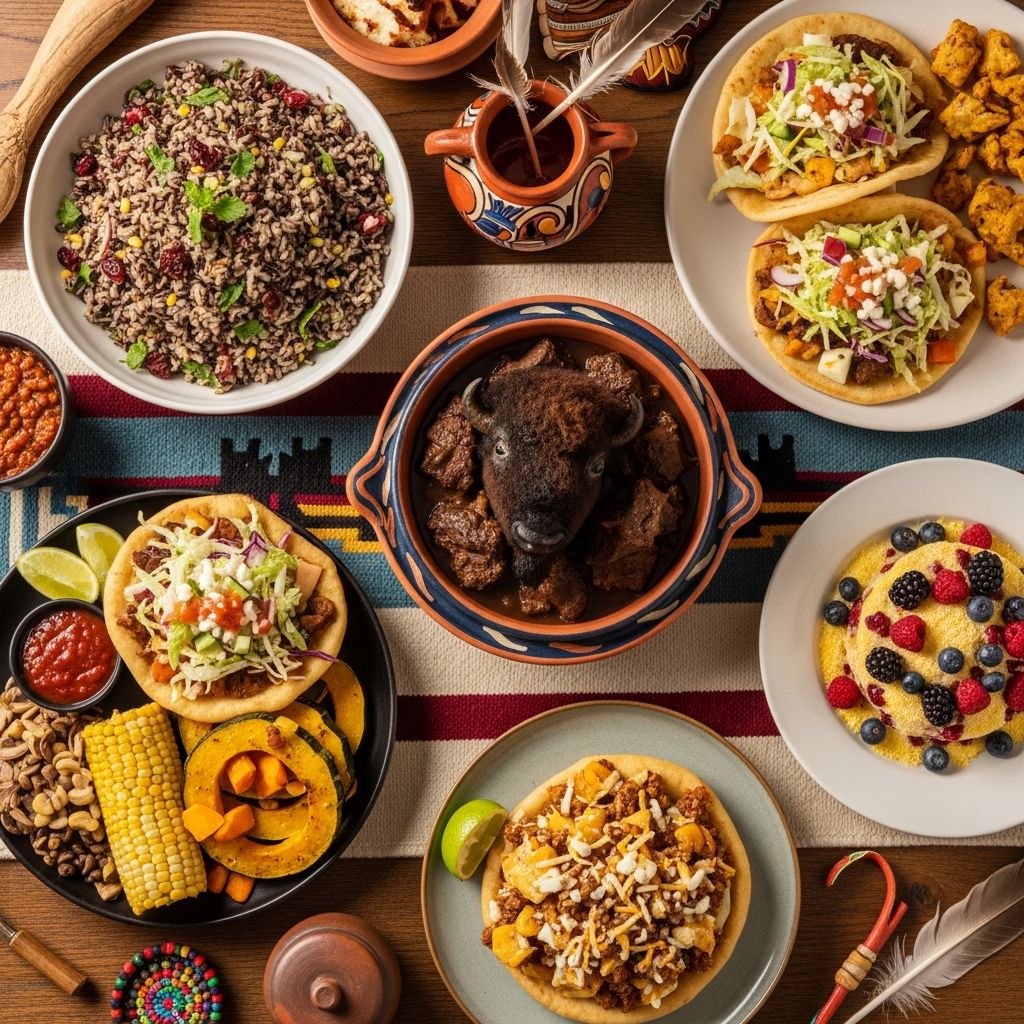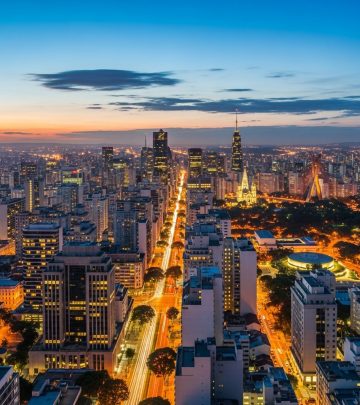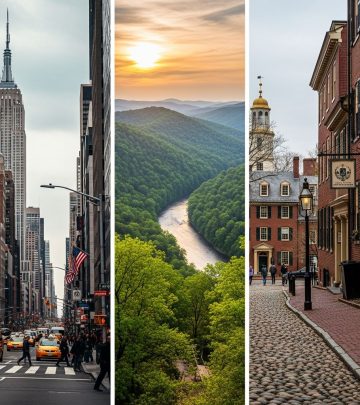13 Top Native American Restaurants to Experience in the U.S.
Experience the flavors and stories of Native America at these standout Indigenous-owned restaurants and cafes across the United States.

Across the United States, a new wave of Native American–owned restaurants and cafes are redefining and reinvigorating Indigenous foodways. These destinations not only serve delicious and inventive cuisine rooted in tradition, but also reconnect communities to their culinary heritage, foster education, promote food sovereignty, and empower Native chefs. Here are thirteen of the best Native American restaurants in the U.S. where history, identity, and contemporary gastronomy meet on every plate.
1. Owamni by the Sioux Chef
Minneapolis, Minnesota
Owamni, led by award-winning chef Sean Sherman (Oglala Lakota) and co-owner Dana Thompson, is widely credited with catalyzing a renaissance in Indigenous cuisine. Located on Dakota homeland near the Mississippi River, Owamni’s menu eschews colonial ingredients such as wheat, dairy, cane sugar, and beef in favor of foods native to North America — think wild turkey, bison, venison, and foraged plants. Inspired dishes like smoked whitefish with sumac or hand-harvested wild rice with cedar and mushrooms highlight the region’s natural bounty. The beverage list features Indigenous teas, shrubs, and non-alcoholic cocktails crafted with foraged herbs. Owamni is not only a must-visit for its food; it also serves as a platform for community engagement, food justice, and Indigenous food sovereignty.
2. Sly Fox Den Too
Charlestown, Rhode Island
This popular eatery, run by chef Sherry Pocknett (Mashpee Wampanoag), is famed for its focus on pre-colonial Wampanoag traditions and flavors of the Northeast. Sly Fox Den Too dishes up hearty options like venison stew, fresh local fish with corn cakes, and Three Sisters succotash featuring squash, beans, and corn. Pocknett’s commitment to education, supporting local food producers, and community events is evident throughout her restaurant, which has become a cornerstone for the revival of Native foodways in New England.
3. Miijim
La Pointe, Wisconsin
Opened in May 2023 on Madeline Island—called Mooningwanekaaning in Ojibwe—Miijim stands out for its blend of traditional Ojibwe cuisine and French culinary flair, reflecting centuries of Ojibwe-European contact. Chef Bryce Stevenson (Red Cliff Band of Lake Superior Chippewa) relies on locally sourced game meats, fish, and wild rice, presenting standout dishes like charcoal-grilled rabbit with French lentils, bison back ribs glazed with wild berries, and gamebird stew with duck heart and gooseberries. Miijim omits gluten, dairy, and refined sugar entirely, staying true to ancestral dietary practices while creating a contemporary fine dining experience.
4. Bison Coffeehouse
Portland, Oregon
Portland’s sole Native-owned coffeehouse, Bison Coffeehouse, was founded by Loretta Guzman (Shoshone-Bannock), who dreamed up the cafe while undergoing cancer treatment. Beyond excellent coffee sourced exclusively from Native roasters, patrons can enjoy signature biscuits, fresh pastries, and a warm, welcoming atmosphere filled with Native art. Bison Coffeehouse often hosts fundraisers for Native-led causes—including bison preservation and supporting Indigenous artists—making it a vital community hub as well as a beloved neighborhood coffee shop.
5. Black Sheep Cafe
Provo, Utah
Founded by chef Bleu Adams (Navajo and Mandan/Hidatsa), Black Sheep Cafe puts a Navajo and Southwestern twist on familiar comfort food. Mainstays include frybread tacos with green chile pork, red chili beef, or barbecue pork, as well as burgers wrapped in nanniskadii—a traditional Navajo flatbread. Try the herbal Yanabah Navajo tea, brewed from greenthread, a wild plant native to the Southwest. The cafe frequently doubles as an art gallery featuring Native artists, fostering a space where food and culture intersect.
6. Mitsitam Native Foods Cafe
Washington, D.C.
Located inside the Smithsonian National Museum of the American Indian, Mitsitam Native Foods Cafe takes its name from an Algonquian word meaning “let’s eat.” After a recent reimagining, Mitsitam’s menu highlights Indigenous flavors from across the Americas, offering frybread, bison burgers, manoomin (wild rice) cakes with salmon, and Southwest lamb stew. An espresso bar serves up posole, wild rice salad, and Hatch green chile corn muffins, allowing diners to sample dishes inspired by tribal traditions from coast to coast.
7. Wahpepah’s Kitchen
Oakland, California
Chef Crystal Wahpepah (Kickapoo) opened Wahpepah’s Kitchen to champion Indigenous values and foodways. Signature menu items include bison meatballs, Kickapoo chili with bison, and a decadent Mayan amaranth chocolate cake. Wahpepah’s work goes beyond feeding guests; her mission encompasses land acknowledgment, food sovereignty, and community education around the health and cultural benefits of Native diets. As the first Native American chef to compete on Food Network’s Chopped, Wahpepah is an influential voice in the Indigenous food movement.
8. Cafe Ohlone
Berkeley, California
Cafe Ohlone honors Ohlone heritage by offering a unique dining experience that pairs storytelling, education, and meals rooted in the native foods of the San Francisco Bay Area. Co-founders Vincent Medina (Muwekma Ohlone) and Louis Trevino (Rumsen Ohlone) serve modern interpretations of traditional fare—think acorn soup, bay laurel–smoked venison, and chia pudding with local fruit. Their gatherings are deeply immersive, often accompanied by Ohlone music and language, drawing a link between culinary heritage and cultural reconstruction.
9. Tocabe: An American Indian Eatery
Denver, Colorado
Tocabe is Denver’s only Native-owned restaurant and specializes in updating ancestral Osage recipes for modern palates. Co-owner Ben Jacobs (Osage Nation) serves up posu bowls with choices like braised bison, blue corn, and tepary beans—a nod to the tribal origins of the ingredients. Bison ribs, cured and glazed with a seasonal berry BBQ sauce, are perennial favorites. Tocabe’s team is passionate about food sourcing transparency, celebrating ingredients grown by Native producers, including blue corn from the Ute Mountain Ute Tribe and beans from Arizona’s Gila River Reservation.
10. Off the Rez
Seattle, Washington
Initially a food truck, Off the Rez now boasts a brick-and-mortar presence at Seattle’s Burke Museum of Natural History. Founder Mark McConnell (Blackfeet) delivers Indian tacos, sweet frybreads covered with berry jams, and wild rice bowls. Fans rave about the cedar blackberry iced tea and braised bison. Off the Rez remains a popular ambassador for Native comfort food, regularly appearing at festivals and pop-ups throughout the Pacific Northwest.
11. Indian Pueblo Kitchen
Albuquerque, New Mexico
Located within the Indian Pueblo Cultural Center, Indian Pueblo Kitchen highlights the culinary traditions of New Mexico’s 19 Pueblos. Guests enjoy inventive plates such as blue corn pancakes, carne adovada, green chile stew, and even Pueblo-style pizzas topped with ancient ingredients. Every dish tells a story, and many feature pueblo-grown corn, beans, and chiles, reinforcing the deep agricultural roots of the Pueblos.
12. Trickster Tacos
Minneapolis, Minnesota
Trickster Tacos, an Omaha/Dakota family-operated food truck, offers “urban Native cuisine” with creative fry bread tacos, such as the Pizza Lovers taco (mozzarella, pepperoni, marinara) and dessert-style fry bread fries topped with locally sourced honey or drizzled with chocolate. The mobility of the food truck enables Trickster Tacos to meet people where they are, introducing new audiences to elevated Indigenous-inspired comfort food.
13. Tomahawks Tacos
Mifflinburg, Pennsylvania
Tomahawks Tacos is celebrated for creative Indigenous-inspired tacos, including fillings like smoked turkey, venison chorizo, and red chili chicken. The small shop adapts traditional flavors using local ingredients and participates in pop-up events and catering, providing culinary education and cultural exchange throughout central Pennsylvania.
Honorable Mentions and New Voices
- Aaimpa’ Café (Sulphur, Oklahoma): Nestled in the Chickasaw Cultural Center, this cafe features homegrown produce from its Three Sisters Garden and serves dishes like buffalo burgers, fry bread tacos, and Chickasaw pashofa.
- Café Gozhóó (Arizona): Showcases traditional ingredients from the White Mountain Apache Tribe in vibrant, nourishing dishes.
- Buffalo Jump NYC (New York City): Sicangu-Lakota–owned, focused on reclaiming Indigenous foodways with inventive bison burgers and wild rice creations.
Why Indigenous Restaurants Matter
The emergence and success of Native American–owned restaurants in the United States are part of a larger movement for food sovereignty, cultural resiliency, and economic empowerment. Through their menus, these restaurants:
- Revitalize ancestral foodways, showcasing pre-colonial ingredients and preparation methods.
- Support Native farmers and producers through careful sourcing and transparency.
- Educate the public about historic and ongoing contributions of Indigenous peoples to American cuisine.
- Foster healing and community connection through shared meals and storytelling.
Essential Elements of Native American Cuisine
- Traditional ingredients: bison, wild game, corn, beans, squash, wild rice, multitudes of foraged plants, herbs, and berries.
- Cultural regionality: Menus adapt to local environments—salmon and berries in the Pacific Northwest, corn and chiles in the Southwest, game meats across the plains, roots and maple in the Northeast.
- Preparation methods: Roasting, smoking, pit-cooking, and using stone-ground flours and traditional leavening.
Table: Highlighted Native American Restaurants
| Restaurant | Location | Signature Dish / Focus |
|---|---|---|
| Owamni | Minneapolis, MN | Cedar-braised wild rice, game meats, foraged teas |
| Miijim | La Pointe, WI | Ojibwe-French fusion, bison ribs, rabbit, wild berries |
| Bison Coffeehouse | Portland, OR | Native-sourced coffee, house biscuits, community events |
| Black Sheep Cafe | Provo, UT | Frybread tacos, Navajo burgers, Navajo tea |
| Tocabe | Denver, CO | Bison posu bowls, frybread, blue corn, tepary beans |
| Off the Rez | Seattle, WA | Indian tacos, frybread, bison, wild rice bowls |
| Wahpepah’s Kitchen | Oakland, CA | Bison chili, amaranth chocolate cake, food sovereignty focus |
Frequently Asked Questions (FAQs)
Q: Why are Native American restaurants significant in the U.S. food scene?
A: These restaurants foster cultural reclamation, celebrate historic Indigenous contributions, and educate the public about food sovereignty and the original flavors of North America, in addition to supporting Native economies.
Q: What ingredients are typically found in Native American cuisine?
A: Common ingredients include bison, venison, corn, beans, squash, wild rice, berries, foraged plants, fish, and game birds. Many restaurants avoid colonial ingredients like wheat, refined sugar, and dairy to showcase pre-contact diets.
Q: Are these restaurants suitable for dietary restrictions?
A: Many Indigenous restaurants naturally accommodate gluten-free, dairy-free, and refined sugar–free diets due to traditional culinary practices. Always check menus or call ahead for specific needs.
Q: How can I support Indigenous restaurants?
A: Visit these establishments, purchase gift cards, follow them on social media, share your experiences, and learn more about and uplift Native-owned food producers and businesses.
Q: Where can I find more information on Native American cuisine?
A: Explore the websites and social media of the restaurants featured above, visit local tribal museums, or seek out cookbooks and food sovereignty networks for further study.












